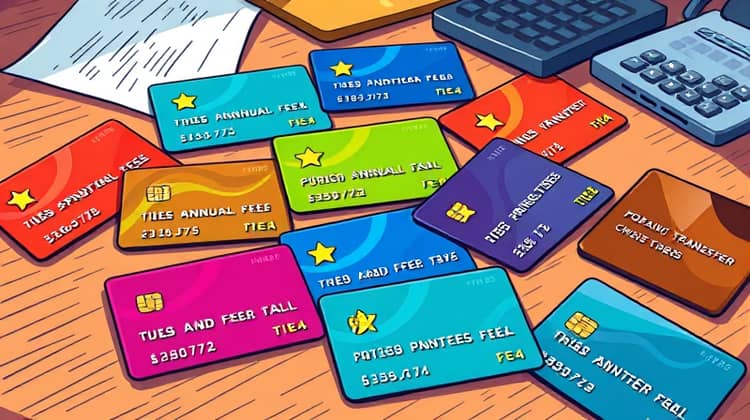Using credit cards can offer numerous benefits, from convenience to rewards programs, but they also come with potential pitfalls that can lead to unexpected costs. Fees associated with credit card use can quickly add up, making it essential for cardholders to understand and manage these charges effectively. By implementing practical strategies, you can avoid common credit card fees and keep your finances on track.
In this article, we will explore seven essential strategies that will not only help you understand the fees your credit card may impose but also assist you in better managing your spending. From understanding your card’s fee structure to keeping an eye on your credit limit, these tips can save you money and enhance your credit card experience. Get ready to take control of your finances and keep those pesky fees at bay.
1. Understand Your Card’s Fees

Before you start using any credit card, it's crucial to educate yourself about the various fees that might be associated with it. Many cards have annual fees, foreign transaction fees, and charges for balance transfers, among others. Understanding these fees can empower you to make informed decisions about which card to use for which purchases.
Additionally, not all credit cards are created equal; some are designed to reward specific spending habits while others might impose heavier penalties for certain activities. Always read the fine print carefully to understand what fees you might incur. Familiarizing yourself with the fee structure not only prepares you for potential charges but also helps you leverage your card’s benefits more effectively.
- Annual Fees: These are charged yearly for maintaining your card account.
- Late Payment Fees: If you miss a payment, expect to incur a fee.
- Returned Payment Fees: If your bank doesn’t honor a payment, you may face a fee.
- Foreign Transaction Fees: These are added when you make purchases outside your home country.
By understanding the fees that come with your credit card, you can tailor your spending behavior to avoid unnecessary costs. This knowledge is essential in maximizing the benefits of your credit card while minimizing the financial pitfalls.
2. Pay Your Balance in Full

One straightforward way to avoid credit card fees is to pay your balance in full each month. When you only make the minimum payment, you often incur interest charges that can significantly increase the overall cost of your purchases.
Paying your balance in full not only saves you money but also improves your credit score. Credit utilization ratio, the amount of credit you’re using compared to your total credit limit, is a significant factor in credit scoring. Keeping your utilization low by paying in full keeps your score healthy.
- Avoid interest charges by paying your total balance every month.
- Improve your credit score with a low credit utilization ratio.
- Reduce financial stress by not carrying debt month to month.
- Enjoy peace of mind knowing your purchases are fully paid off.
Ultimately, paying off your balance is one of the best strategies to keep your finances in check and avoid seeking unnecessary fees, allowing you to use your credit card as a reliable financial tool rather than a source of debt.
3. Avoid Cash Advances

While credit cards can be used for cash advances, they often come with high fees and interest rates that start accruing immediately. This can make cash advances a costly option, further complicating your financial situation. It's crucial to understand that cash advances are treated differently than regular purchases in terms of interest rates and fees.
Moreover, some credit cards have separate limits for cash advances, which may be significantly lower than your overall credit limit. This can lead to unexpected fees and difficulties in managing your finances. For these reasons, it’s advisable to avoid this feature unless it's an absolute emergency.
4. Beware of Foreign Transaction Fees

If you travel frequently or shop online at international retailers, it’s essential to be aware of foreign transaction fees. These fees can often range from 1% to 3% of the purchase amount, which can add up quickly and take a bite out of your budget.
To avoid these fees, look for credit cards that do not charge for international transactions. Many travel rewards cards offer no foreign transaction fees, making them a better option for frequent travelers.
- Research credit cards that offer no foreign transaction fees.
- Schedule purchases in advance when using cards internationally to mitigate fees.
- Consider using travel-specific cards for better rewards and lower fees.
- Check exchange rates to understand how they impact your purchases.
By choosing the right credit card and being vigilant about potential foreign transaction fees, you can save a significant amount of money while enjoying international purchases and travels.
5. Be Cautious with Balance Transfers

Balance transfers might seem like a great way to manage credit card debt, but they often come with significant fees. Many cards charge a fee of 3% to 5% of the transferred balance, reducing the overall benefit of transferring your debt to a card with a lower interest rate.
It's essential to calculate whether the savings from a lower interest rate offset the balance transfer fee. Make sure you understand any promotional rates and how long they last as well. If you fail to pay off the balance before the higher interest rate kicks in, you could end up in a worse financial position than before.
6. Use Alerts to Prevent Late Fees

One effective strategy to avoid late payment fees is to set up alerts on your credit card account. Many credit card issuers offer online banking and app features that allow you to receive notifications when your payment is due or when the balance reaches a certain threshold.
Utilizing these alerts ensures that you stay informed and can budget accordingly, helping you avoid missing a payment due date. Staying proactive can save you from incurring unnecessary charges and will keep your credit score intact.
- Set up payment due date alerts through your card issuer’s app.
- Create calendar reminders for due dates.
- Use mobile banking to view your balance frequently.
By establishing alert systems, you can significantly reduce the chance of incurring late fees, create more accountability in your spending habits, and enhance your overall financial management.
7. Keep an Eye on Your Credit Limit

Monitoring your credit limit is vital for managing your finances and avoiding over-limit fees. Exceeding your credit limit can lead to additional charges, which can accumulate quickly and add financial strain. Many credit cards automatically deny transactions that would exceed the limit, while some may process transactions but charge an over-limit fee.
To prevent these fees, always check your remaining available credit before making purchases, especially large ones. Keeping track of your spending can help you manage your credit utilization and maintain a healthy score.














